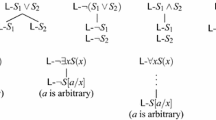Abstract
The Hermeneutic-Dialectic (HD) Method is analyzed in terms of such theory construction issues as theory vs. method, necessary evidence, and process vs. content. Traditional experimental procedure is also contrasted with what takes place in the HD method. It is held that problems with traditional research in psychology stem from theory and not method. Questions are raised concerning data interpretation in the present research, and how such findings are settled upon in the first place. The paper closes with a discussion of stereotypy as reflecting the natural propensity for human beings to reason predicationally. This discussion draws on the tenets of logical learning theory.
Similar content being viewed by others
References
Culler, J. (1982).On deconstruction: Theory and criticism after structuralism. Ithaca, NY: Cornell University Press.
Freeman, M. (1995). What is called hermeneutics?New Ideas in Psychology, 13, 65–69.
Holton, G. (1973).Thematic origins of scientific thought: Kepler to Einstein. Cambridge, MA: Harvard University Press.
Kuhn, T. S. (1970).The structure of scientific revolutions (2nd ed.). Chicago: University of Chicago Press.
Latendresse, D., Smith, M., & Rettig, S. (1996). Black identity: The O. J. Simpson Case.Journal of Social Distress and the Homeless, 5 273–303.
Lippmann, W. (1946).Public opinion. New York: Penguin Books.
Marrow, A. J. (1969).The practical theorist: The life and work of Kurt Lewin. New York: Basic Books.
Palmer, R. E. (1969).Hermeneutics: Interpretation theory in Schleiermacher, Dilthey, Heidegger, and Gadamer. Evanston, IL: Northwestern University Press.
Rettig, S. (1990).The discursive social psychology of evidence: Symbolic construction of reality. New York and London: Plenum Press.
Rychlak, J. F. (1979).Discovering free will and personal responsibility. New York: Oxford University Press.
Rychlak, J. F. (1981).A philosophy of science for personality theory (2nd ed.). Malabar, FL: Robert E. Krieger Publ. Co.
Rychlak, J. F. (1988).The psychology of rigorous humanism (2nd ed.). New York: New York University Press.
Rychlak, J. F. (1991).Artificial intelligence and human reason: A teleological critique. New York: Columbia University Press.
Rychlak, J. F. (1994).Logical learning theory: A human teleoleogy and its empirical support. Lincoln, NE: University of Nebraska Press.
Shannon, C. E., & Weaver, W. (Eds.). (1962).The mathematical theory of communication. Urbana: University of Illinois Press.
Spence, K. W. (1956).Behavior theory and conditioning. New Haven: Yale University Press.
Author information
Authors and Affiliations
Rights and permissions
About this article
Cite this article
Rychlak, J.F. An enquiry into the hermeneutic-dialectic method of inquiry. J Soc Distress Homeless 5, 305–317 (1996). https://doi.org/10.1007/BF02091655
Issue Date:
DOI: https://doi.org/10.1007/BF02091655




